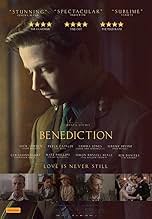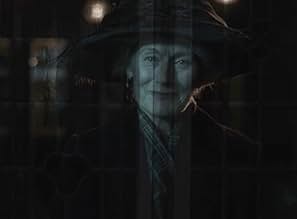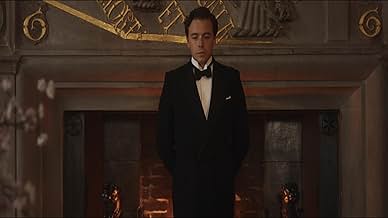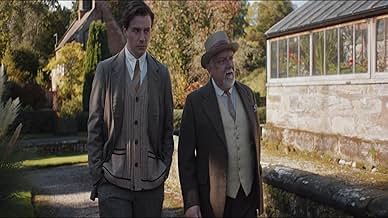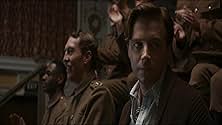Siegfried Sassoons lebenslange Suche nach persönlicher Erlösung durch seine Erfahrungen mit der Familie, dem Krieg, seiner Schriftstellerei und zerstörerischen Beziehungen bleibt ungelöst.Siegfried Sassoons lebenslange Suche nach persönlicher Erlösung durch seine Erfahrungen mit der Familie, dem Krieg, seiner Schriftstellerei und zerstörerischen Beziehungen bleibt ungelöst.Siegfried Sassoons lebenslange Suche nach persönlicher Erlösung durch seine Erfahrungen mit der Familie, dem Krieg, seiner Schriftstellerei und zerstörerischen Beziehungen bleibt ungelöst.
- Auszeichnungen
- 9 Gewinne & 19 Nominierungen insgesamt
Empfohlene Bewertungen
In that sense, the whole film is definitely sentimental, nostalgic... and gently bitter (as oppose to bitter sweet). Even the scenes of horror from WW1 are somewhat veiled with distinctively old fashioned verses of Siegfried Sassoon. For some reason most scenes with special effects (the scene where Siegfried dropping his medal being most noteworthy) feel so dated too, as in 90's film or a student project of SiFi.
My biggest issue in enjoying the film was that I gradually lost empathy with Siegfried. He starts off as gentle, smart young man, restrained but with lucid enough self-awareness and noble idealism of a youth. Then he dips in relationships with pretty but frivolous guys, predictably gets hurt by them, and then opts for a more conventional life of marriage and child in the selfish hope that the wife and son may give him the light he craves for. And then he ends up a bitter, distant, irritable and irritating old man, who vents out to his poor wife and suffering son, practically the only people left around, for their failure to become the light he wanted them to be.
Now, it's not entirely his fault alone. The horror of the war that scarred him for life and the intolerant society that kept him from acting upon his true love have a lot to answer for. Even his shallow, egoistic post-war lovers are largely because such bold 'crazy' ones were the only people who could live somewhat openly as gay in the repressive British society.
Nevertheless Siegfried had so many privileges - his uppercrust background, artistic talent, social recognition, and few but supportive friends. Despite of it all, he makes choices against his own truth and heart, and ends up a bitter resentful old man. His last ditch attempt to God wouldn't give him the solace he craves for.
I guess that is actually the message of the film - how giving up one's true heart and truth, whether by one's own will or circumstances, can leave one just a shell of oneself. And what's the worth of a poet when he can't speak his truth?
Overall it left me somewhat unsatisfied after 2 hours of run despite of its many enjoyable and charming virtues. I suspect Terence Davies himself has never quite overcome the pessimistic view he manifested in his early trilogy.
Siegfried Sassoon (Jack Lowden/Peter Capaldi) was a Second Lieutenant during World War I. His younger brother, Hamo (Thom Ashley), is killed during the war. Siegfried is further horrified by the tremendous human toll in death and lifelong disability caused by military leadership in which he no longer believes. Already a well-known poet, he refuses further participation in the war and is sent to the Craiglockhart War Hospital near Edinburgh technically for shell shock. There Siegfried meets and befriends Wilfred Owen (Matthew Tennyson), a much younger man. Siegfried also explicitly recognizes his own homosexuality.
The film then follows his anti-war sensibilities through snippets of his poetry and his chaotic love life, mainly focused on Ivor Novello (Jeremy Irvine) and Stephen Tennant (Calam Lynch/Anton Lesser). At a certain point, he tries to escape the chaos by marrying Hester Gatty (Kate Phillips/Gemma Jones). Together they have a son. George (Richard Goulding), but clearly, the marriage does not heal Sassoon's memories.
The film uses footage from the trenches in World War I and occasionally flips in time between the young Sassoon and the elderly Sassoon. Some of the editing decisions made little sense to me, particularly the early scene forecasting his conversion to Catholicism. Some edits made the film more complex than necessary. Nevertheless, the movie successfully portrays Sassoon as disabled because of World War I, from which he never psychologically recovered. This is clear from the multiple references to Wilfred Owens' poem, "Disabled."
It's not a biography, it's not really about war, or love, or living a closeted life during a specific period in UK history; it's not about aging; it's not about poetry, or trauma. The title suggests it might be about guidance, blessing, or redemption, but in regard to what, I can't really say.
It's also about all of those things, depending on the minute. The movie changes focus quite a few times, and I found that incredibly frustrating. After two and a half hours, I did not leave with any firmed-up impression of Sassoon, or the basic intention of the film.
Having said that, the lead actor and the rest are all perfectly enjoyable to watch, the dialogue is organic, and aside from spliced-in war footage, it is pleasing to the eye. It's a good choice for watching on demand or otherwise at home. But it's not a movie that lingers.
The movie has serious Evelyn Waugh vibes, especially "Brideshead Revisited." WWI stories always fascinate me, especially when they're about how much the war screwed up the psyches of the people who were caught up in it. This film is overall satisfying, if a bit repetitive. A huge amount of time is spent on Sassoon, a more or less openly gay man, and his various love affairs, all with caricatures of flamboyant, bitchy gay men and all of them leaving you wondering what he wanted to be around them for in the first place. Seriously, were all gay men this hateful in the 1920s? But then you think about how marginalized they were, and the answer is, well, yeah, maybe they were. They had a lot to be hateful about.
The one reason to see this movie is a big one, and that's the central performance of Jack Lowden. He's magnificent in this. Easily award worthy, though a group like the Academy Awards wouldn't recognize him in a million years.
Grade: A-
Wusstest du schon
- WissenswertesSeven of Siegfried Sassoon's poems were narrated in the film: Concert Interpretation, Died of Wounds, When I'm among a Blaze of Lights, To my Mother, To my Brother, Attack, and Invocation.
- PatzerSassoon did not discard his M.C. medal as shown in this film. He tossed away the medal's corresponding ribbon. The medal itself was inherited by Sassoon's son George.
- Zitate
Dr. Rivers: Why not?
Siegfried Sassoon: Too afraid, too inhibited. Shamed by an inner corruption. Or perhaps it's simply because of... What's the phrase? "The love that dare not speak its name."
Dr. Rivers: You are not alone in that respect.
Top-Auswahl
- How long is Benediction?Powered by Alexa
Details
- Erscheinungsdatum
- Herkunftsländer
- Offizielle Standorte
- Sprachen
- Auch bekannt als
- 베네딕션
- Drehorte
- Chillington Hall, Port Lane, Brewood, Wolverhampton WV8 1RE, Vereinigtes Königreich(Interiors and outdoor scenes)
- Produktionsfirmen
- Weitere beteiligte Unternehmen bei IMDbPro anzeigen
Box Office
- Bruttoertrag in den USA und Kanada
- 201.093 $
- Eröffnungswochenende in den USA und in Kanada
- 50.970 $
- 5. Juni 2022
- Weltweiter Bruttoertrag
- 847.418 $




